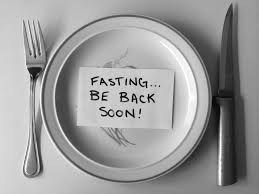|
The aim of this short article is to explain how we Orthodox Christians fast. It should be stated upfront that fasting is not mandatory for Orthodox Christians. Unlike Islam, it is not a sin if one does not fast. Having said that, fasting is one of the best weapons in our arsenal in dealing with the struggles and the temptations which we face. How do we fast?
Fasting in the Orthodox Christian Tradition is the abstinence, for a time, from certain foods and practices. These foods are meat, fish, animal products, eggs, wine (alcohol) and oil. If that seems like a lot from which to fast, you are not wrong. It is nigh on impossible to find a meal at a restaurant which complies completely with Orthodox fasting practices. As stated earlier, this standard is not mandatory. Fasting like all things in the Orthodox life should be conducted in line with the advice of a spiritual father. They can give advice as to the level of fasting which is correct for you individually. Too little and you aren't going to be able to make enough progress in the spiritual life. Too much and there are two possibilities, either you can fall into pride about how much you are fasting or you can bite off too much and end up falling into despair when you do not accomplish what you set out to do. The spiritual father is also there to advise on how to fast if you have a physical condition which makes fasting impossible or hard beyond your capabilities. He will advise you on other ways by which you can reap the spiritual benefits of fasting. In line with his advice, it may also be of benefit to also give up some things which may distract us from our true aims, especially during extended periods of fasting such as Great Lent. One may give up television or social media or anything else which can lead us away from what is really important. When do we fast? Orthodox Christians fast throughout the year. We fast on Wednesdays and Fridays, before we go for Holy Communion, during extended periods of fasting before major feasts, as well as on days which our Church designates as strict fasts. Wednesdays and Fridays We fast on Wednesdays and Fridays throughout the year with only three exceptions. These exceptions are Bright Week, which is the week after Easter, the week after the feast of Pentecost and the days between Christmas and the 5th of January. There are also some fast-free days which may happen to land on Wednesdays or Fridays. In those cases there is no fast. We fast on Wednesdays to remember the ways in which we, like the Disciples who abandoned Christ after His arrest, let Christ down and betray him through our sins. We fast on Fridays in remembrance of His crucifixion and death. Holy Communion We fast before receiving Holy Communion on the day before from the foods listed earlier (meat, animal products, oil and alcohol). Additionally, we fast the from midnight or whenever our last meal of the night before is. This is so that the Body and Blood of Christ might be the first thing to touch our lips on that day. For Presanctified Liturgies or other times when Holy Communion is taken at night, we try to not eat during that day but if that is too difficult it is possible to fast from noon. This again is to be decided by one's spiritual father. Saint Nicodemus the Hagiorite writes: “… fasting before partaking of Communion is not decreed by the divine Canons. Nevertheless, those who are able to fast even a whole week before it, are doing the right thing” (Commentary of the 13th canon of Sixth Ecumenical Council). Extended periods of fasting The Orthodox Church, before a major feast, often has extended periods of fasting. There are four main periods of fasting: Great Lent and Holy Week, Advent (Nativity Fast), The Dormition Fast and The Apostles' Fast. Great Lent and Holy Week is preceded by a week without meat, and consists of 49 days of strict fasting from Clean Monday until Easter. On weekends, oil and wine are allowed. On the Annunciation and on Palm Sunday fish is allowed. In the Lenten services, fasting and the way it should be conducted are made clear: “Let us fast with a fast pleasing to the Lord. This is the true fast: the casting off of evil, the bridling of the tongue, the cutting off of anger, the cessation of lusts, evil talking, lies and cursing. The stopping of these is the fast true and acceptable” (Monday Vespers of the First Week). Advent, also known as the Nativity Fast, is the 40 day fasting period starting on November 15 (or November 28) going until Christmas. The fast here is lighter, being of a different and more celebratory nature than Great Lent, and fish is allowed until the final week of the fast. In this fast we prepare for Christ's coming to the world and His Incarnation. The Dormition Fast is one where we fast for fourteen days before the Feast of the Dormition of the Theotokos. St. Symeon of Thessalonica writes that, “The fast in August [Dormition fast] was established in honor of the Mother of God the Word; Who, foreknowing Her repose, ascetically labored and fasted for us as always, although She was holy and immaculate, and had no need for fasting.” This is a strict fast. The final major fasting period varies in its length each year depending on the date of Easter. It starts from the Monday after the feast of All Saints and goes until the 29th of June. This is a strict fast and one of the oldest fasts of our Church. It commemorates the Apostles and their activities in spreading the Good News throughout the world, and provides an opportunity to remember the missionary work going on now in our times. It is often useful, if one wishes to fast, to have an Orthodox Calendar. These can assist with knowing when to fast because these rules are often quite complex and there are many great feasts which are days of fasting yet are not widely known. The next article in this miniseries on fasting will explain why fasting is a practice of the Orthodox Church and why it happens in the way it does.
0 Comments
Leave a Reply. |
Categories
All
|

 RSS Feed
RSS Feed
